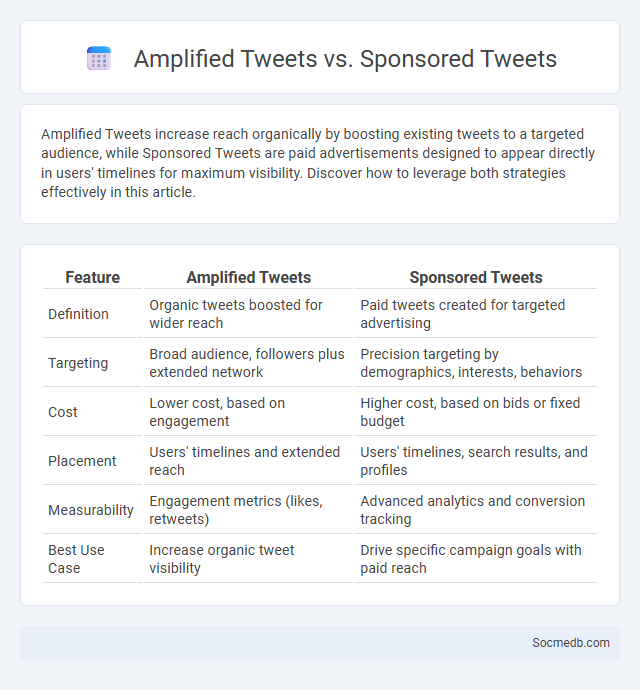
Photo illustration: Amplified Tweets vs Sponsored Tweets
Amplified Tweets increase reach organically by boosting existing tweets to a targeted audience, while Sponsored Tweets are paid advertisements designed to appear directly in users' timelines for maximum visibility. Discover how to leverage both strategies effectively in this article.
Table of Comparison
| Feature | Amplified Tweets | Sponsored Tweets |
|---|---|---|
| Definition | Organic tweets boosted for wider reach | Paid tweets created for targeted advertising |
| Targeting | Broad audience, followers plus extended network | Precision targeting by demographics, interests, behaviors |
| Cost | Lower cost, based on engagement | Higher cost, based on bids or fixed budget |
| Placement | Users' timelines and extended reach | Users' timelines, search results, and profiles |
| Measurability | Engagement metrics (likes, retweets) | Advanced analytics and conversion tracking |
| Best Use Case | Increase organic tweet visibility | Drive specific campaign goals with paid reach |
Understanding Amplified Tweets: Definition and Purpose
Amplified Tweets are social media posts boosted through paid promotion or enhanced engagement features to increase their visibility and reach a broader audience beyond your followers. These tweets leverage targeting options and algorithmic prioritization to maximize engagement, driving higher interaction rates and brand awareness. Understanding the purpose of Amplified Tweets helps you strategically enhance your social media presence and achieve marketing goals.
What Are Sponsored Tweets? Key Features Explained
Sponsored tweets are paid advertisements on Twitter designed to reach a broader audience beyond organic followers. Key features include targeted audience options based on demographics, interests, and behavior, the ability to track engagement metrics such as impressions, clicks, and conversions, and seamless integration within users' timelines for higher visibility. These ads enhance brand awareness and drive specific actions, making them essential for social media marketing strategies.
The Concept of Social Media Amplification
Social media amplification refers to the process by which content spreads rapidly across platforms through sharing, likes, comments, and influencer engagement, exponentially increasing its reach and impact. Your brand's message can achieve greater visibility and engagement by leveraging viral trends and targeted amplification strategies. Effective social media amplification enhances audience interaction, boosts brand awareness, and drives higher conversion rates.
Differences Between Amplified Tweets and Sponsored Tweets
Amplified tweets increase the reach of organic content by promoting existing posts to a broader audience without altering the original tweet, often enhancing engagement through retweets or likes. Sponsored tweets, in contrast, are paid advertisements explicitly designed for targeted marketing campaigns, featuring call-to-action buttons and tailored messaging to drive conversions. The key difference lies in amplification boosting natural engagement while sponsored tweets prioritize precise audience targeting and measurable advertising outcomes.
Goals and Strategies of Tweet Amplification
Effective tweet amplification centers on clear goals such as increasing brand visibility, driving website traffic, and boosting engagement rates. Employing targeted strategies like leveraging trending hashtags, partnering with influencers, and optimizing tweet timing enhances reach and interaction. Your content's success depends on consistent analysis of performance metrics to refine amplification approaches continuously.
Benefits of Using Amplified Tweets in Campaigns
Amplified Tweets enhance your social media campaigns by increasing visibility and engagement through retweets, likes, and shares, reaching a broader audience. Leveraging targeted amplification tools allows precise audience segmentation, ensuring your message resonates with the most relevant users. This strategic use of amplified content boosts brand awareness and drives higher conversion rates by maximizing the impact of each tweet in your campaign.
ROI Comparison: Sponsored vs Amplified Tweets
Sponsored tweets deliver measurable ROI by targeting specific demographics, increasing brand visibility, and driving higher engagement rates compared to organic posts. Amplified tweets, while beneficial for expanding reach through existing followers, often yield lower conversion rates and require more effort to maintain consistent impact. Maximizing your social media investment involves analyzing the cost-effectiveness and engagement metrics between sponsored and amplified tweet strategies.
Selecting the Right Amplification Method for Your Brand
Selecting the right amplification method for your brand depends on understanding your target audience's behavior and preferences across platforms like Instagram, TikTok, and LinkedIn. Leveraging influencer partnerships, paid ads, or organic content strategies ensures maximum engagement and conversion tailored to your brand's goals. You must analyze data and insights regularly to optimize amplification and achieve sustainable growth.
Measuring Success: Metrics for Each Twitter Strategy
Measuring success on Twitter requires analyzing specific metrics tailored to each strategy, such as engagement rate for content marketing, follower growth for brand awareness, and click-through rate for promotional campaigns. Monitoring impressions and retweets helps evaluate reach, while tracking conversions and hashtag performance provides insights into campaign effectiveness. Utilizing tools like Twitter Analytics and third-party platforms enables precise measurement and optimization of strategy outcomes.
Best Practices for Effective Twitter Amplification
Maximizing Twitter amplification requires crafting concise, engaging tweets that leverage trending hashtags and incorporate high-quality visuals to boost visibility. Scheduling posts during peak user activity times enhances engagement rates, while actively interacting with followers through replies and retweets fosters a loyal community. Utilizing Twitter analytics to monitor performance metrics enables data-driven adjustments, optimizing reach and impact across the platform.
 socmedb.com
socmedb.com